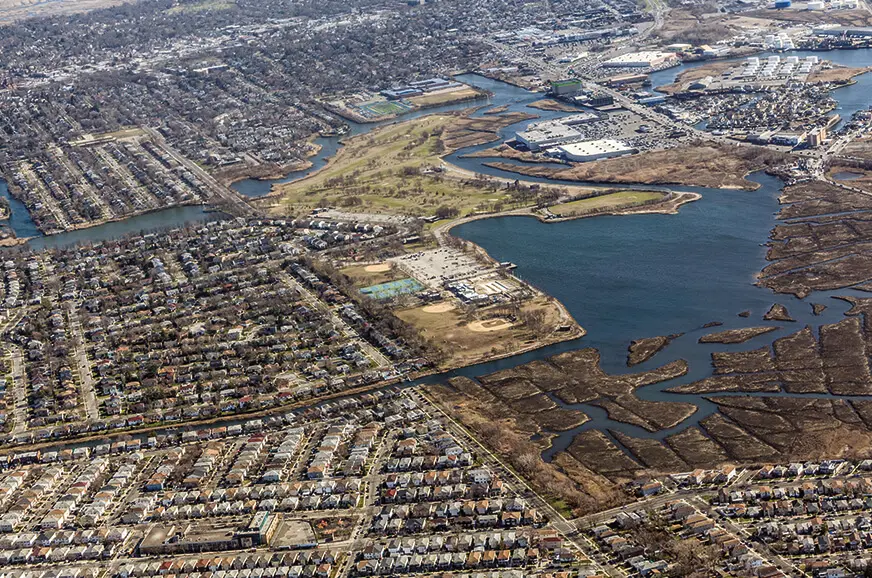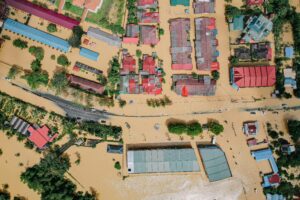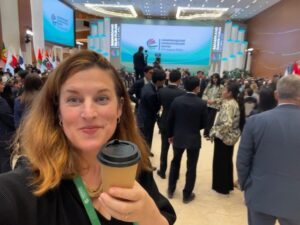Water governance and the new urban agenda
A strong mega trend in low income countries and emerging economies across Asia-Pacific and Africa is rapid urbanization - amalgamated by economic growth and climate change impacts – that points to sharpening of water competition and increased need for water related infrastructure and institutional development. Consequently, water allocation and re-allocation within cities and between sectors will be imperative and the governance systems in place to assure that water is allocated according to country priorities of inclusive economic growth and poverty reduction. Importantly it is not only about allocating water as such, but also governing the social and economic benefits provided by water resources, such as food and energy, and water supply and sanitation services.
For centuries cities have been critical for wealth creation as trading points and hubs for innovations and production of goods and services. Urbanization is rapid in most parts of Asia and Africa and according to the United Nations urban areas inhabit over half of the world’s population – 54% in 2014. Close to half of the world’s urban dwellers reside in relatively small settlements of less than 500,000 inhabitants, while only around one in eight live in the 28 mega-cities with more than 10 million inhabitants. Continuing population growth and urbanization are projected to add 2.5 billion people to the world’s urban population by 2050, with nearly 90 per cent of the increase concentrated to Asia and Africa.
In Asia-Pacific urban populations are growing at 2.3% per annum and rapidly expanding cities will have an even more significant level of demand for water resources, particularly from energy, food and industry sectors. Land-use changes manifested as urban sprawl implies uncontrolled encroachment of water sources at the fringe of the city and or pollutions from industrial and domestic wastewater – most of it being completely untreated. Surface and groundwater are systematically over-exploited leading to scarcity situations and ecosystem losses. It is likely that if a business as usual perspective is applied many cities in Asia-Pacific will be in very dire water security situations leading to increasing competitions and potential conflicts between water user groups, the urban-rural areas as well as between countries sharing water. Parallel urbanization trends are found also at the African continent and where similar precarious water situations are faced, particularly in the arid and semi-arid parts of the region.
The rapid urbanization, coupled with economic growth and increasing water demands, is compounded by climate change and where precipitation and storm events, heatwaves and droughts and sea-level rise and coastal flooding are already events that increasingly affects the Asia-Pacific and Africa regions.
It is apparent that both countries and cities will have to invest more in appropriate water infrastructures and institutional development and make much more use of demand side management measures. A key for this to happen on a much required bigger scale is to address urban governance as a means to unlock financing, institutional strengthening and enable for example increased reuse of waste water or water use savings technologies. Governance decides the outcome of decision-making processes and is related to the quality of institutions and relationships among key stakeholders.
Cities are dependent on their hinterland and any urban strategy needs to take in to account urban and rural dynamics of demographic changes, water and land use, water demand and allocation, the political economy as well as factoring in climate change impacts. But, looking at cities along the watershed may not be sufficient since many cities are now extracting water beyond their own watershed. As water demands are on the rise, there is an increasing need to look at the “problem-shed”, where issues of governance of water allocation and re-allocation will be increasingly important between various user groups. For example cities like Chennai in India and Nairobi in Kenya are going ever growing distances away from the city and their own watersheds to secure water for burgeoning populations and growing economies and impacting water uses for example food production and eco-systems maintenance.
Urbanization comes with several water related challenges and opportunities. Governance remain a key area for meeting such challenges as well as reaping potential social and economic benefits and their distribution within society. Consequently, governance of allocation and reallocation of water resources and related services and their social and economic benefits and waste water governance will be even more critical to build socially and economically prosperous and sustainable urban futures. But this will not be sufficient unless water resources governance are integrated with other urban challenges of for example food, energy and land security that also go beyond the city itself and integrates urban and rural dynamics of the political economy.
To address growing urban water related challenges and to reap and distribute potential social and economic benefits it will be key to:
- Increase focus on the governance of water allocation and re-allocation and related social and economic benefits of water use and the governance of urban waste water
- Maintain benefits of investment already made in water supply and sanitation progress and to unlock financing to meet new and increased urban demands for water supply and sanitation
- Increase the credit worthiness of cities in low-income countries and emerging economies and decentralize financing (the power and politics between city and national governments)
- Address governance within and beyond the urban space in integrated ways across physical and decision-making landscapes
- Address water resources allocation and re-allocation beyond cities’ own watersheds. Since an increasing number of cities are looking at large scale inter-basin water transfers to secure water, the watershed or basin perspective may not be sufficient. Hence, think “problem-shed” too as a way of addressing solutions
- Prioritize wrapping urban water governance around Asian and African government development priorities related to, for example energy and food security, and improving peoples’ lives
- Prioritize closing the urban policy and planning implementation gap and think in terms of “solutions nexus”, that is, to work to connect governance – financing – Infrastructure/technology for more efficient, equitable and sustainable investments in both “hardware” and “software”.
- Address the governance enigma of parallel formal and informal water services provision and decision-making systems: How can the informal systems move towards the formal, but without losing the social and economic benefits that informal systems produce? In the urban context it would among other things mean to address slums settlements through lenses of improved public services and access to land and secure housing.
At the international level urban challenges have received much attention lately. The United Nations Conference on Housing and Sustainable Urban Development (Habitat III) held in Quito, Ecuador, 17-20 October 2016, successfully adopted the New Urban Agenda. Water is squarely embedded within this agenda, and various commitments motivating actions related to urban water management and services. It will be critical to work with SDG-6 to Ensure availability and sustainable management of water and sanitation for all as a means to achieve SDG 11 of Making cities and human settlements inclusive, safe, resilient, and sustainable. Importantly – and not well covered by international provisions – it is required to also go beyond water as a public service for social transformation to also acknowledge the economic transformative role of water. Water underpin economic development and continued inclusive economic growth and poverty reduction will require investments and sound management of water and related services within and beyond the urban space.
Written by Håkan Tropp, Director, WGF
For more information about this post or to provide comment, contact us at watergovernance@siwi.org








